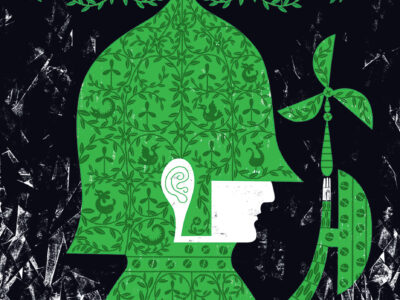
Of all the ethical controversies over DNA screening, the one ordinary people are most likely to encounter may be prenatal testing for diseases such as Down Syndrome. For some, the tests have become a minor battlefield in the culture wars, because a positive result frequently leads would-be parents to abort the fetus.
But, says Ruth Schwartz Cowan, the Janice and Julian Bers Professor of the History and Sociology of Science, DNA screening—in adults and in utero alike—ultimately increases our choices and improves our health. And, she contends, for all the criticism from abortion opponents, the net result of prenatal screening is fewer abortions.
“Before, there were couples who would go to a pediatrician with a kid who has Down Syndrome and ask, ‘How do I keep this from happening again?’” Cowan said. “And [the pediatrician would] say, ‘Stop having children.’” But, she said, that advice didn’t always take. When subsequent pregnancies occurred, such couples were likely to terminate the pregnancy—even though they didn’t know whether it, too, would lead to a Down Syndrome baby.
“When this test became possible, they recommended it to these kinds of couples as a way for these people to continue having children without fearing the condition,” Cowan concluded. “Which means that the test was pro-natal rather than anti-natal.”
Cowan’s hour-long talk about the history and logistics of DNA screening took place in a venue that, until recently, might have seemed unusual: MarBar, the second-floor barroom above the Marathon Grill at 40th and Walnut streets. For several years, spaces like this have hosted the Penn Science Café, a monthly gathering where Penn scientists get to speak informally about their specialties before an audience of students, alums, and anyone else interested in thoughtful conversation over food and drinks.
Jordan Reese, Penn’s manager of science communications, said the informal gatherings are part of a national trend—mainly sponsored by universities, but occasionally independent of them—towards organizing science chats outside of classroom settings. Though Penn sponsors the program, the sponsorship consists of little more than arranging the space. Cowan’s audience paid for their own beers and nachos.
Cowan, whose books include 2008’s Heredity and Hope: The Case for Genetic Screening, began her chat by reviewing the noxious history that, even today, makes many people leery of genetic testing. For most people, she said, the practice still evokes Nazi Germany’s atrocities.
“The Nazis established eugenic courts,” she said. “They required professionals, physicians, nurses, clergy—and they were listed in the enabling legislation—to report any person that they came across who seemed to have any in a number of genetic conditions” such as schizophrenia, alcoholism, or mental retardation. The courts could mandate sterilization. Euthanasia was also practiced. “The Nazis designated these lives as not worth paying for,” she said.
But even though such gruesome spectacles aren’t part of life in a modern democracy, there are aspects of contemporary life that lead people to view genetic testing with great suspicion. For one thing, people worry about privacy: Who’s in control of their data? These days, we give up genetic data all the time—from blood samples taken moments after birth to voluntary donations made later in life.
“If you were born after 1970, you have already made a donation to a tissue bank,” Cowan said, referring to the neonatal tests that in 49 of 50 states do not even require parental consent. “They have the child’s Social Security number and name on it,” she said. Genetic data may be collected dozens of times after that, too, often paired with anonymized medical data to help researchers ferret out hitherto unknown links between genomic mutations and diseases.
Privacy is such a worry, in turn, because we fear stigmatization should the DNA’s contents become known. “Imagine how people would feel if they had the gene for schizophrenia, and the doctor’s secretary told her friend whose son was about to marry your daughter.” There’s also the possibility of self-stigmatization, the pain of learning you’re at risk of some hereditary condition (and can’t do anything about it).
And there are worries unique to America’s healthcare system, where people rely on employers to provide their health insurance—and where employers, in turn, fear any hike in premiums. Just because it’s illegal for a boss to fire you upon secretly sleuthing out DNA data showing you’re at increased risk for breast cancer doesn’t mean it’s not a worry.
Cowan, though, argues that the positive effects of genetic testing vastly outweigh the concerns—which she sees as something of a red herring, anyway. “Anybody who wants to find out about our medical conditions can do so pretty fast,” she said in response to a question from the audience. “So to withhold from a quality medical team because you’re afraid information may be revealed is to lock the door after the thieves have already left the house.”
Speaking generally, Cowan sketched two different families of tests. Mendelian tests look for diseases that can be caused by a single gene, like Tay-Sachs disease, sickle-cell anemia, or Huntington’s disease. “It means a person is either a carrier or afflicted,” she said. Such tests allow adults who want to have children to plan accordingly.
More complicated—practically and ethically—are the non-Mendelian screens, which forecast the likelihood of diseases that have more complicated chains of causation. “All they can tell you is you have an increased risk,” she said. “There are a whole lot of people who get breast cancer who don’t have the gene, and there are a whole lot of people who have the gene and who die of other things, and never get breast cancer.”
Noting that U.S. law allows researchers to patent tests for various genetic sequences—even though the genetic sequences are things that our own bodies produce over and over again—Cowan pronounced the non-Mendelian screenings “socially and ethically wild.” For instance, researchers nowadays can spot an anomaly on someone’s DNA. But they don’t necessarily know what the anomaly means.
And even where science has established a link between DNA data and a disease, it doesn’t always mean there’s an action that can be taken after diagnosis. Cowan noted that while researchers have linked a certain gene to Alzheimer’s disease, it’s forbidden to test for it among people who haven’t exhibited symptoms of the condition. Why? Because no therapy exists.
Yet, said Cowan, genetic testing can buy huge amounts of time when it’s applied to patients already diagnosed with a disease. In certain cancers, DNA data can show which sorts of therapies are most effective in combating the disease. Once upon a time, oncologists would try one chemotherapy, and if it didn’t work they would move to another, and then another—a grueling, painful process. Today, researchers know that “certain genetically engineered therapy agents target certain mutations.” So, for instance, a lung cancer patient could have his tumor biopsied to determine which mutation it carried, and which treatment would likely be most effective.
At the end of her talk, Cowan took questions from an audience of roughly 30, divided evenly between students and older alums. The crowd sat at tables around the professor, snacking as they listened—a contrast to the three-hour seminar she led just beforehand. But Cowan said she enjoyed the job of speaking to a non-specialized crowd. “I think it’s the whole point of scholarship,” she said. “If you can’t talk to the general public, what are we getting paid for?” –Michael Schaffer
Upcoming Science Café speakers include Jonathan Moreno, the David and Lyn Silfen University Professor and Professor of Medical Ethics and the History and Sociology of Science, who will talk on March 17 about “Bioethics in Washington.” Events begin at 6 p.m. at MarBar inside the Marathon Grill at 40th and Walnut Streets. For more information, contact Jordan Reese at 215-573-6604.




